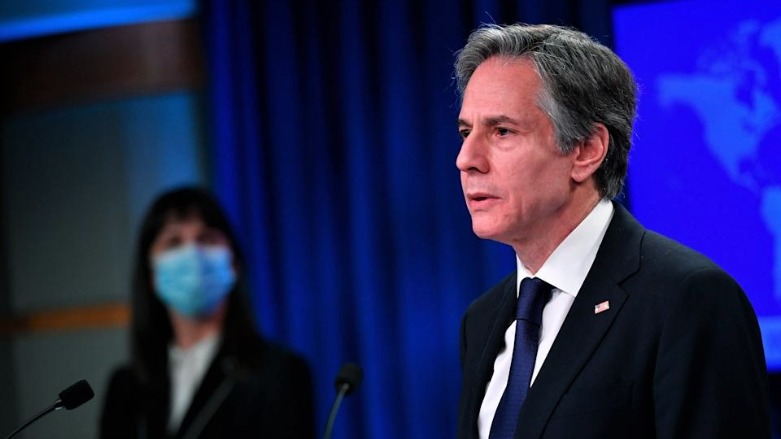US: We will engage with Taliban, if it serves our interests
Secretary of State Antony Blinken listed US interests as counterterrorism; humanitarian assistance to the Afghan people; and upholding “the rights of all Afghans, especially women and girls,” while allowing those Afghans who want to leave the country to do so.

WASHINGTON DC (Kurdistan 24) – In a press conference on Wednesday, Secretary of State Antony Blinken said that the US was prepared to deal with a Taliban-led government in Afghanistan in the future, if it served US interests.
As journalists challenged aspects of the Biden administration’s policy in Afghanistan, including its coordination with the Taliban over the evacuations through Kabul airport, Blinken first explained why such coordination was necessary: it helped to ensure the safe movement of people.
Then Blinken continued, expanding on the US position toward the Taliban. He explained that future dealings were possible, if they “can advance the enduring interests we will have” in the region.
Blinken’s statement about future dealings with the Taliban followed two days after the CIA Director, William Burns, met secretly in Kabul with Abdul Ghani Baradar, the de facto leader of the Taliban.
At US request, in 2010, Pakistan arrested Baradar, who was in Karachi at the time, as The Washington Post explained. In 2018, as the Trump administration began negotiations with the Taliban on a US withdrawal, it asked Pakistan to release Baradar from prison.
Subsequently, Baradar led the Taliban delegation in negotiations with the US, which were conducted in Qatar. Those discussions resulted in the 2020 Doha agreement.
The Post report provided no details about Monday’s talks between Burns and Baradar. Presumably, the outcome was reasonable from a US perspective, as Blinken went out of his way on Wednesday to affirm Washington’s readiness to deal with the Taliban.
After first affirming the necessity of US coordination with the Taliban over evacuation flights, Blinken spoke further on the subject of US dealings with the organization.
“We’ve been engaged with the Taliban for some time diplomatically going back years,” Blinken explained, “to try to advance a peaceful settlement of the conflict in Afghanistan.”
The Obama administration began negotiating with the Taliban through Pakistan, and the Trump administration initiated direct talks.
There are still, ongoing discussions between the Taliban and members of the former Afghan government, Blinken continued. Those talks concern “a transfer of power and some inclusivity in a future government,” and “it’s in our interest, where possible, to support those efforts,” he said.
“Going forward,” Blinken added, “we will judge our engagement with any Taliban-led government in Afghanistan based on one simple proposition: our interests, and does it help us advance them or not.”
Blinken then listed those interests: counterterrorism; humanitarian assistance to the Afghan people; and upholding “the rights of all Afghans, especially women and girls,” while allowing those Afghans who want to leave the country to do so.
Blinken seemed to suggest that the Taliban had agreed to such conditions. “If it [a Taliban-led government] makes good on its commitments,” that is “a government we can work with,” he said. If not, we will “use every appropriate tool at our disposal to isolate that government” and “Afghanistan will be a pariah.”
The US is scheduled to leave Afghanistan by August 31—five days from now. On Tuesday, European leaders sought to persuade President Joe Biden to push that deadline back. But the Taliban rejected the possibility, and Biden maintained his original position, although he did direct the Pentagon to develop contingencies to act beyond the August 31 deadline, if that should prove necessary.
Since at least 2009—in the early days of the Obama administration, when he was Vice-President—Biden has been extremely skeptical about the purpose and value of the US intervention in Afghanistan.
As president, Biden is now acting on his earlier view. Donald Trump has been sharply critical of the US withdrawal, although Biden is, in fact, executing the Doha agreement that the Trump administration itself reached with the Taliban.